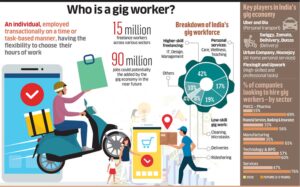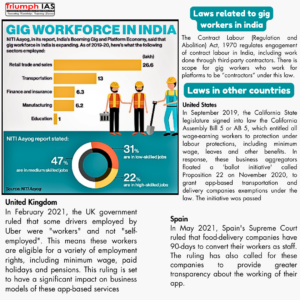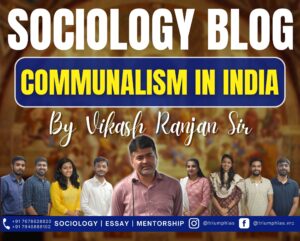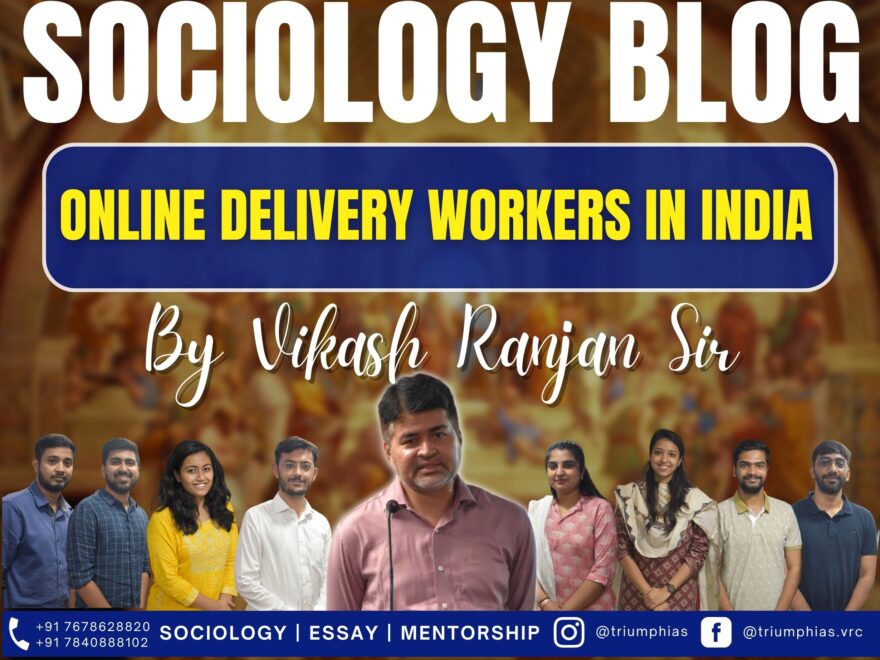Online Delivery Workers(Gig Workers)
(Relevant for Sociology Optional for Civil Services Examination)
Paper 1: Unit-6 Work and Economic Life: Formal and Informal Organization of Work

Online Delivery Workers Data
- A NITI Aayog study estimated that in 2020−21, 77 lakh workers were engaged in the gig economy. The gig workforce is expected to expand to 2.35 crore workers by 2029−30.
- In 2019−20, 10 lakh people were working as delivery executives. Out of these, women constituted 67,900 workers till June 2019.
Sociological analysis about the condition of Gig worker
Other keywords that can be used:
|
Work Conditions
- On contract paper, food delivery platforms term the delivery workers as “independent contractors” or “delivery partners.” This kind of classification, compounded by the lack of legal security and conceptual ambiguity, is forcing such workers to work almost 12 hours or more per day and on less than prescribed minimum wage. Hence, they are not considered as traditional “employees.” Consequently, these workers do not benefit from labour rights as guaranteed in the labour laws of the country.
- The Fair Work India Ratings (2022) speak of the declining earnings and deteriorating working conditions of delivery labourers. The report has evaluated and rated the working conditions of 12 food delivery platforms in India. Of these, Swiggy and Zomato were found to have a poor record.
- The rapidly burgeoning gig workforce is ushering in a new economic revolution, delivery workers face acute exploitation in many aspects. It commences from the phase of recruitment itself, wherein workers are burdened to incur all expenses of transportation facilities and gadgets without compensation at any stage of service. Moreover, all popular food delivery platforms charge `1,500−`2,000 as security deposit from each newly joining worker. Thus, delivery workers start their first working day with debt, resembling modern debt bondage.
- There are other major aspects of the delivery platform work that directly affects their well-being. The living and working conditions of delivery workers in India exemplify the fact that they are forced to compromise with their mental and physical health to eke out a barely sustainable wage
- Resurging working class consciousness: Delivery workers across India face acute exploitation and are deprived of basic labour rights, the recent struggle carried out by Zomato and Swiggy workers in Kerala resembles the resurging working class consciousness among them.
- Asymmetry of Information: These online platforms function on the basis of asymmetry of information which converts to unequal distribution of power between the delivery workers, customers and online food chains. Delivery workers do not know how they get orders, how their ratings drop and how the overall system works. Therefore, delivery workers are forced to work without possessing the right to information about their basic labour rights.

Women Delivery Workers
- Late and less entry of Women: Recruitment of women workforce had started in 2016, for the first time, in India. Though the number of women in the workforce has increased from 40,000 in 2018, it has not reached even one-third of the total workforce of delivery executives. Late and less entry of women workers as delivery partners indicates different variables associated with access to work and workplace outside their house.
- Gender-based subordination: The work of delivery partners demands certain basic requirements, for example, a motorcycle, scooter or bicycle with a driving license.
-
- It is observed that all the women workers belong to economically downtrodden families. In that context, “getting permission” from the “family and society” to work in a public space can be a matter of concern for many women..
- The working patterns of these food delivery partners are to make movements to different locations to collect and deliver food. In this process, access and use of hygienic washrooms and maintenance of menstrual hygiene becomes a few major concerns.
- It is observed that women delivery partners are not given work after 6 pm to maintain their safety. According to Zomato, entry of women workers as delivery partners needs different sets of initiatives and working patterns. The concern regarding safety become another layer of gender-based subordination.
- The flexibility of work time and income pattern is another significant issue shared by women workers.
Few Steps Taken
- New Labour Code and Delivery Workers
-
- Labour laws pertaining to gig workers are covered only under the Code on Social Security, 2020. Section 2(35) in Chapter I of the code elucidates a gig worker as “a person who participates in a work arrangement and earns from such activities outside of a traditional employer–employee relationship.” Though the code precisely discerns the delivery workers from regular and non-employee classes of workers, it lacks clarity as to who exactly a gig worker is.
- Section 2(26) in Chapter I of the Code on Social Security defines an “employee” as “a person employed on wages by an establishment, either directly or through a contractor to do any skilled, semi-skilled, unskilled or any other work, whether the terms of employment be expressed or implied.”
- On a positive note, the code mandates provision of provident fund, gratuity, insurance employee compensation and maternity benefits.
- It assigns the union and state governments to frame adequate social security schemes on matters relating to accident insurance, life and disability cover, old age protection, maternity benefits, etc.
- It puts an obligation on the delivery workers to contribute 1%−2% of their annual turnover into the Central State Funds which may be used for carrying out the welfare measures.
- Zomato mentioned four major initiatives taken by the company for the “safety” of the women delivery partners. It includes access to safety related education and tools, contactless deliveries by default, extended support from restaurant partners, safety handy emergency call button (SOS) and dedicated support to use washrooms in public spaces.
- The formation of All India Gig Workers Union has become a platform for the women delivery workers to make their voice heard by the authority.
Way Forward:
- The need of the hour is to consider food delivery partners as labourers and they have to be brought under the purview of the organised and formal sector.
- There should be a legal and administrative framework to keep the aggregator companies under the purview of the labour laws in the country. Such efforts would compel the gig economy unicorns to categorise workers as full-time employees.
- Labour class consciousness among delivery workers in India would also play a pivotal role in strengthening their unity to fight pay cuts and other benefits.
- The recent resurging labour consciousness and strikes of Meituan delivery workers in China, Talabat food delivery workers in Dubai and online delivery workers in South Korea under the Parcel Delivery Workers’ Solidarity Union for better wage, better working conditions and social security provisions, can be seen as a catalyst factor in accelerating resistance of delivery workers in India against acute exploitative policies of online giant food delivery platforms.
Reference: Economic Political Weekly
Related Blogs …
 |
 |

To master these intricacies and fare well in the Sociology Optional Syllabus, aspiring sociologists might benefit from guidance by the Best Sociology Optional Teacher and participation in the Best Sociology Optional Coaching. These avenues provide comprehensive assistance, ensuring a solid understanding of sociology’s diverse methodologies and techniques.
META TAGS:
Gig Economy, Online Delivery Workers, Labour Laws, Gender Disparity, Work Conditions, India, Labour Class Consciousness, Zomato, Swiggy, Social Security, Gig Workers Union, Gig Economy, Online Delivery Workers, Labour Laws, Gender Disparity, Work Conditions, India, Labour Class Consciousness, Zomato, Swiggy, Social Security, Gig Workers Union
Why Vikash Ranjan’s Classes for Sociology?
Proper guidance and assistance are required to learn the skill of interlinking current happenings with the conventional topics. VIKASH RANJAN SIR at TRIUMPH IAS guides students according to the Recent Trends of UPSC, making him the Best Sociology Teacher for Sociology Optional UPSC.
At Triumph IAS, the Best Sociology Optional Coaching platform, we not only provide the best study material and applied classes for Sociology for IAS but also conduct regular assignments and class tests to assess candidates’ writing skills and understanding of the subject.
Choose The Best Sociology Optional Teacher for IAS Preparation?
At the beginning of the journey for Civil Services Examination preparation, many students face a pivotal decision – selecting their optional subject. Questions such as “which optional subject is the best?” and “which optional subject is the most scoring?” frequently come to mind. Choosing the right optional subject, like choosing the best sociology optional teacher, is a subjective yet vital step that requires a thoughtful decision based on facts. A misstep in this crucial decision can indeed prove disastrous.
Ever since the exam pattern was revamped in 2013, the UPSC has eliminated the need for a second optional subject. Now, candidates have to choose only one optional subject for the UPSC Mains, which has two papers of 250 marks each. One of the compelling choices for many has been the sociology optional. However, it’s strongly advised to decide on your optional subject for mains well ahead of time to get sufficient time to complete the syllabus. After all, most students score similarly in General Studies Papers; it’s the score in the optional subject & essay that contributes significantly to the final selection.
“A sound strategy does not rely solely on the popular
Opinion of toppers or famous YouTubers cum teachers.”
It requires understanding one’s ability, interest, and the relevance of the subject, not just for the exam but also for life in general. Hence, when selecting the best sociology teacher, one must consider the usefulness of sociology optional coaching in General Studies, Essay, and Personality Test.
The choice of the optional subject should be based on objective criteria, such as the nature, scope, and size of the syllabus, uniformity and stability in the question pattern, relevance of the syllabic content in daily life in society, and the availability of study material and guidance. For example, choosing the best sociology optional coaching can ensure access to top-quality study materials and experienced teachers. Always remember, the approach of the UPSC optional subject differs from your academic studies of subjects. Therefore, before settling for sociology optional, you need to analyze the syllabus, previous years’ pattern, subject requirements (be it ideal, visionary, numerical, conceptual theoretical), and your comfort level with the subject.
This decision marks a critical point in your UPSC – CSE journey, potentially determining your success in a career in IAS/Civil Services. Therefore, it’s crucial to choose wisely, whether it’s the optional subject or the best sociology optional teacher. Always base your decision on accurate facts, and never let your emotional biases guide your choices. After all, the search for the best sociology optional coaching is about finding the perfect fit for your unique academic needs and aspirations.
Follow us :
🔎 https://www.instagram.com/triumphias
🔎https://www.youtube.com/c/TriumphIAS
https://t.me/VikashRanjanSociology
Find More Blogs
|
Scope of the subject and comparison with other social sciences |
|||
|
|
|
|
Modernity and social changes in Europe |

